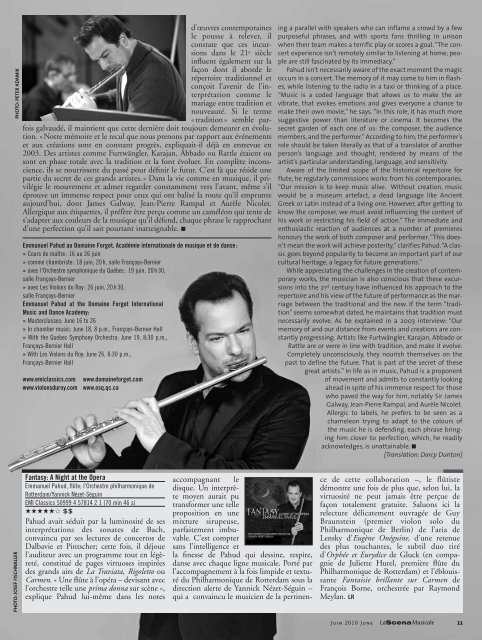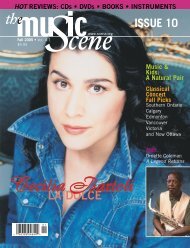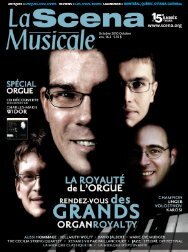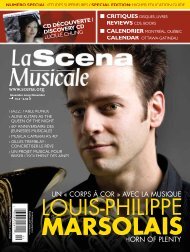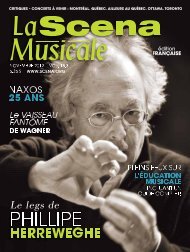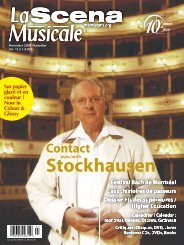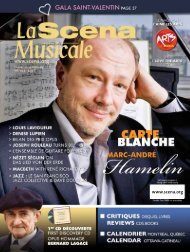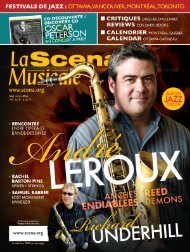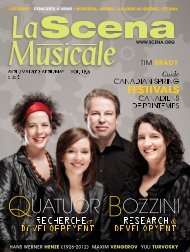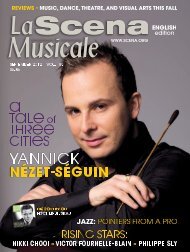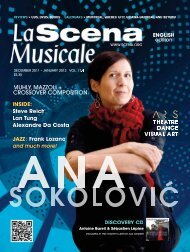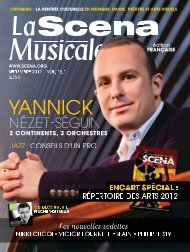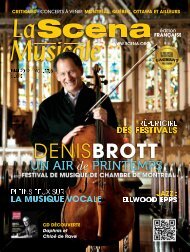Adobe Acrobat PDF complet (18 MB) - La Scena Musicale
Adobe Acrobat PDF complet (18 MB) - La Scena Musicale
Adobe Acrobat PDF complet (18 MB) - La Scena Musicale
You also want an ePaper? Increase the reach of your titles
YUMPU automatically turns print PDFs into web optimized ePapers that Google loves.
PHOTO: JOSEF FISCHNALLER PHOTO: PETER ADAMIK<br />
d’œuvres contemporaines<br />
le pousse à relever, il<br />
constate que ces incursions<br />
dans le 21 e siècle<br />
influent également sur la<br />
façon dont il aborde le<br />
répertoire traditionnel et<br />
conçoit l’avenir de l’interprétation<br />
comme le<br />
mariage entre tradition et<br />
nouveauté. Si le terme<br />
«tradition » semble parfois<br />
galvaudé, il maintient que cette dernière doit toujours demeurer en évolution.<br />
« Notre mémoire et le recul que nous prenons par rapport aux événements<br />
et aux créations sont en constant progrès, expliquait-il déjà en entrevue en<br />
2003. Des artistes comme Furtwängler, Karajan, Abbado ou Rattle étaient ou<br />
sont en phase totale avec la tradition et la font évoluer. En complète inconscience,<br />
ils se nourrissent du passé pour définir le futur. C’est là que réside une<br />
partie du secret de ces grands artistes. » Dans la vie comme en musique, il privilégie<br />
le mouvement et admet regarder constamment vers l’avant, même s’il<br />
éprouve un immense respect pour ceux qui ont balisé la route qu’il emprunte<br />
aujourd’hui, dont James Galway, Jean-Pierre Rampal et Aurèle Nicolet.<br />
Allergique aux étiquettes, il préfère être perçu comme un caméléon qui tente de<br />
s’adapter aux couleurs de la musique qu’il défend, chaque phrase le rapprochant<br />
d’une perfection qu’il sait pourtant inatteignable. ■<br />
Emmanuel Pahud au Domaine Forget, Académie internationale de musique et de danse :<br />
» Cours de maître: 16 au 26 juin<br />
» comme chambriste : <strong>18</strong> juin, 20 h, salle Françoys-Bernier<br />
» avec l’Orchestre symphonique du Québec : 19 juin, 20 h30,<br />
salle Françoys-Bernier<br />
» avec Les Violons du Roy : 26 juin, 20 h30,<br />
salle Françoys-Bernier<br />
Emmanuel Pahud at the Domaine Forget International<br />
Music and Dance Academy:<br />
» Masterclasses: June 16 to 26<br />
» In chamber music: June <strong>18</strong>, 8 p.m., Françoys-Bernier Hall<br />
» With the Quebec Symphony Orchestra: June 19, 8:30 p.m.,<br />
Françoys-Bernier Hall<br />
» With Les Violons du Roy: June 26, 8:30 p.m.,<br />
Françoys-Bernier Hall<br />
www.emiclassics.com<br />
www.violonsduroy.com<br />
www.domaineforget.com<br />
www.osq.qc.ca<br />
Fantasy: A Night at the Opera<br />
Emmanuel Pahud, flûte; l’Orchestre philharmonique de<br />
Rotterdam/Yannick Nézet-Séguin<br />
EMI Classics 50999 4 57814 2 1 (70 min 46 s)<br />
★★★★★✩ $$<br />
Pahud avait séduit par la luminosité de ses<br />
interprétations des sonates de Bach,<br />
convaincu par ses lectures de concertos de<br />
Dalbavie et Pintscher; cette fois, il déjoue<br />
l’auditeur avec un programme tout en légèreté,<br />
constitué de pages virtuoses inspirées<br />
des grands airs de <strong>La</strong> Traviata, Rigoletto ou<br />
Carmen. « Une flûte à l’opéra – devisant avec<br />
l’orchestre telle une prima donna sur scène »,<br />
explique Pahud lui-même dans les notes<br />
ing a parallel with speakers who can inflame a crowd by a few<br />
purposeful phrases, and with sports fans thrilling in unison<br />
when their team makes a terrific play or scores a goal. “The concert<br />
experience isn’t remotely similar to listening at home; people<br />
are still fascinated by its immediacy.”<br />
Pahud isn’t necessarily aware of the exact moment the magic<br />
occurs in a concert. The memory of it may come to him in flashes,<br />
while listening to the radio in a taxi or thinking of a place.<br />
“Music is a coded language that allows us to make the air<br />
vibrate, that evokes emotions and gives everyone a chance to<br />
make their own movie,” he says. “In this role, it has much more<br />
suggestive power than literature or cinema. It becomes the<br />
secret garden of each one of us: the composer, the audience<br />
members, and the performer.” According to him, the performer’s<br />
role should be taken literally as that of a translator of another<br />
person’s language and thought, rendered by means of the<br />
artist’s particular understanding, language, and sensitivity.<br />
Aware of the limited scope of the historical repertoire for<br />
flute, he regularly commissions works from his contemporaries.<br />
“Our mission is to keep music alive. Without creation, music<br />
would be a museum artefact, a dead language like Ancient<br />
Greek or <strong>La</strong>tin instead of a living one. However, after getting to<br />
know the composer, we must avoid influencing the content of<br />
his work or restricting his field of action.” The immediate and<br />
enthusiastic reaction of audiences at a number of premieres<br />
honours the work of both composer and performer. “This doesn’t<br />
mean the work will achieve posterity,” clarifies Pahud.“A classic<br />
goes beyond popularity to become an important part of our<br />
cultural heritage, a legacy for future generations.”<br />
While appreciating the challenges in the creation of contemporary<br />
works, the musician is also conscious that these excursions<br />
into the 21 st century have influenced his approach to the<br />
repertoire and his view of the future of performance as the marriage<br />
between the traditional and the new. If the term “tradition”<br />
seems somewhat dated, he maintains that tradition must<br />
necessarily evolve. As he explained in a 2003 interview: “Our<br />
memory of and our distance from events and creations are constantly<br />
progressing. Artists like Furtwängler, Karajan, Abbado or<br />
Rattle are or were in line with tradition, and make it evolve.<br />
Completely unconsciously, they nourish themselves on the<br />
past to define the future. That is part of the secret of these<br />
great artists.” In life as in music, Pahud is a proponent<br />
of movement and admits to constantly looking<br />
ahead in spite of his immense respect for those<br />
who paved the way for him, notably Sir James<br />
Galway, Jean-Pierre Rampal, and Aurèle Nicolet.<br />
Allergic to labels, he prefers to be seen as a<br />
chameleon trying to adapt to the colours of<br />
the music he is defending, each phrase bringing<br />
him closer to perfection, which, he readily<br />
acknowledges, is unattainable. ■<br />
[Translation: Darcy Dunton]<br />
accompagnant le<br />
disque. Un interprète<br />
moyen aurait pu<br />
transformer une telle<br />
proposition en une<br />
mixture sirupeuse,<br />
parfaitement imbuvable.<br />
C’est compter<br />
sans l’intelligence et<br />
la finesse de Pahud qui dessine, respire,<br />
danse avec chaque ligne musicale. Porté par<br />
l’accompagnement à la fois limpide et texturé<br />
du Philharmonique de Rotterdam sous la<br />
direction alerte de Yannick Nézet-Séguin –<br />
qui a convaincu le musicien de la pertinence<br />
de cette collaboration –, le flûtiste<br />
démontre une fois de plus que, selon lui, la<br />
virtuosité ne peut jamais être perçue de<br />
façon totalement gratuite. Saluons ici la<br />
relecture délicatement ouvragée de Guy<br />
Braunstein (premier violon solo du<br />
Philharmonique de Berlin) de l’aria de<br />
Lensky d’Eugène Onéguine, d’une retenue<br />
des plus touchantes, le subtil duo tiré<br />
d’Orphée et Eurydice de Gluck (en compagnie<br />
de Juliette Hurel, première flûte du<br />
Philharmonique de Rotterdam) et l’éblouissante<br />
Fantaisie brillante sur Carmen de<br />
François Borne, orchestrée par Raymond<br />
Meylan. LR<br />
Juin 2010 June 11


